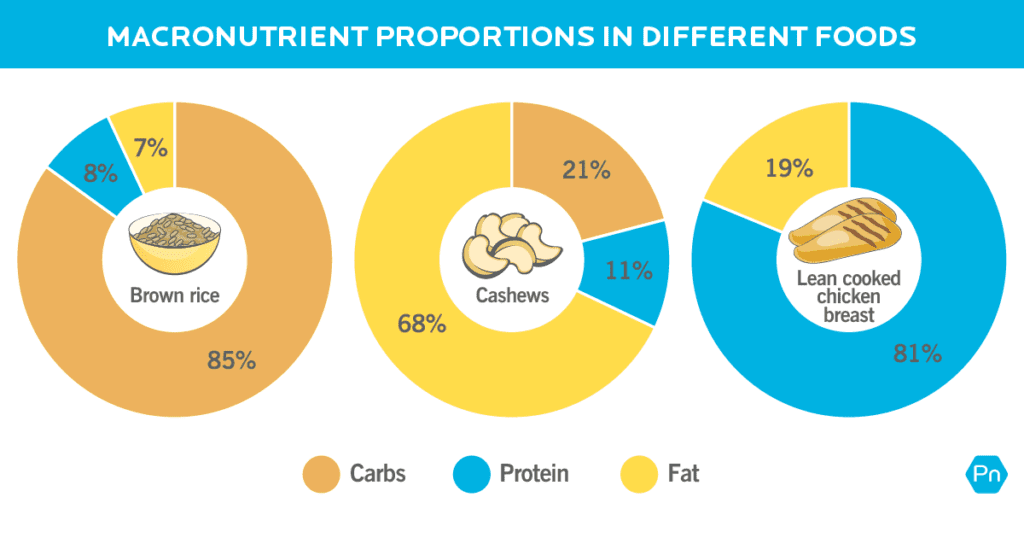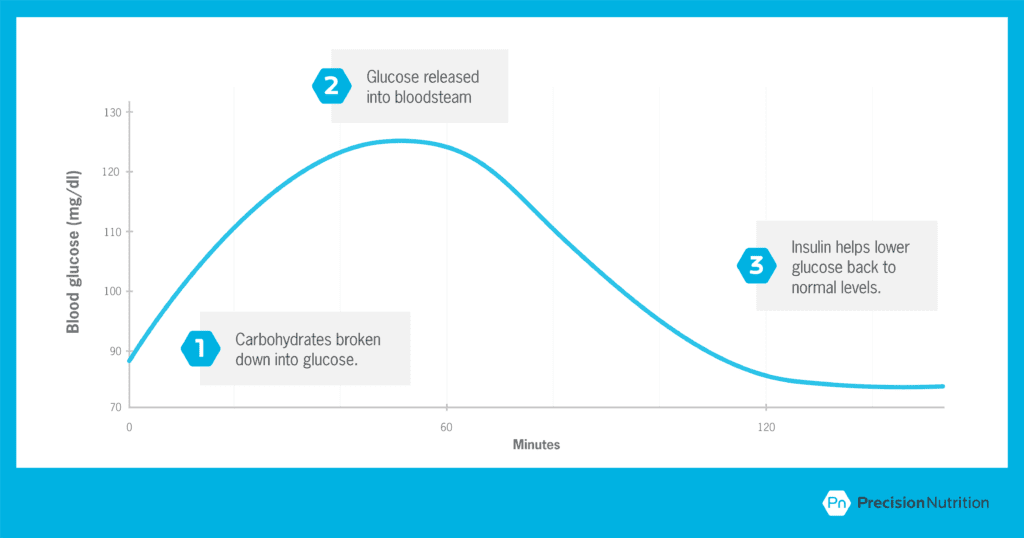Reviewed by Brian St. Pierre, MS, RD
Enter any nutrition-related discussion and someone is bound to have strong feelings about carbs.
Cutting them out ruthlessly saved one person’s waistline. Increasing them generously saved another person’s athletic gains.
With so many opinions about carbs, it’s important to separate fact from myth.
So, let’s break down what the different types of carbs are, how they work, and their role in a healthy nutritional plan.
What are carbs?
Carbs (carbohydrates) are an important macronutrient found in various foods.
And they’re a major source of energy for your body’s functions and activities.
Carbs come in different forms, and the impact of carbs on your body varies depending on the type of carb. Understanding these differences can help you make informed dietary choices that’ll help you feel your best.
The myth of “simple” vs. “complex” carbohydrates
You’ve probably heard of two categories of carbs: simple carbs and complex carbs.
At some point, you may have been taught that carbohydrate-rich foods fall neatly into one bucket or the other.
Only that’s not really true.
The problem with this classification? It only refers to the chemical structure of a carbohydrate and doesn’t take into account how that carbohydrate is digested or affects your health.
It also overlooks that carbohydrate-rich foods usually have both simple and complex carbs. So calling an apple a “simple carb” and white bread a “complex carb”—as many folks do—doesn’t actually make sense.
To understand why, let’s look at “simple carbs” and “complex carbs” in a little more detail.
▶ Simple carbs generally refer to carbohydrates that are made up of single sugar molecules like glucose (the smallest unit of sugar), or double sugar molecules like lactose and sucrose.
▶ Complex carbs generally refer to carbohydrates made up of three or more sugar molecules held together by chemical bonds.
You’ll likely hear general statements about these groups like, “Simple carbohydrates are digested and absorbed quickly, while complex carbohydrates take longer to break down.”
This is where things start to go sideways. How quickly and easily a carbohydrate is metabolized depends not only on whether it’s “simple” or “complex” but also on the types of chemical bonds it has.
For example, starch and fiber are both “complex” carbohydrates, but they can digest very differently.
Certain types of starch (like amylopectin, found in white rice) contain sugars with chemical bonds that can be easily broken down, allowing for quick absorption into the bloodstream.
Fiber, on the other hand, is held together by chemical bonds that aren’t easily broken down. As a result, the sugars aren’t digested or absorbed by the body. In fact, fiber can help slow the absorption of other sugars into the bloodstream.
Another example: White bread is—chemically speaking—mostly composed of complex carbohydrates. And yet, white bread raises blood sugar levels faster than almost any other food.
In reality, most carbohydrate-rich whole foods provide a mix of simple and complex carbohydrates. So separating them into neat categories just isn’t possible—and doesn’t actually tell you how they behave in the body, or how healthy they are overall.
Instead, we suggest making nutrition choices based on carbs being “highly processed” vs. “minimally processed.”
(Learn more about how processing affects food quality from one of our most popular infographics: ‘What should I eat?!’ Our 3-step guide for choosing the best foods for your body)
A closer look at carbohydrate structure: Monosaccharides, oligosaccharides, and polysaccharides
As we’ve mentioned, there’s more than one kind of sugar.
Here’s what to know about the different sugars that make up carbs:
- Monosaccharides are the simplest sugars and include glucose (from sources like honey), fructose (found in apples or pears), galactose (flavored yogurts or dairy-free milk), mannose (fresh fruit), and ribose (mushrooms and eggs). Simple sugars cannot be broken down any further.
- Oligosaccharides are short chains of monosaccharide units and include sucrose (table sugar), maltose (wheat, cornmeal, and barley), lactose (milk), and trehalose (mushrooms, yeast).
- Polysaccharides are larger chains of monosaccharide units and include digestible polysaccharides (starch, dextrins, glycogen), partially digestible polysaccharides (inulin, raffinose), and indigestible polysaccharides (cellulose, pectin).
Different sugar structures—as well as the food source they come from—can have an effect on your perceptions of texture and sweetness and enzymes in your mouth and digestive system
Why are carbs important?
Sugars and starches are broken down into monosaccharides through digestion before they’re absorbed by the body.
From there, they go to the liver to fill glycogen stores (which serves as a sort of energy reserve for carbohydrates). Then, as needed, they enter your bloodstream to provide energy to cells throughout your body.
Here are five reasons carbs help your body function optimally:
Reason #1: Carbs are your body’s main source of energy.
Sugars and starches are ultimately broken down into glucose, and glucose is the primary energy source for your cells.
Therefore, carbs are important for your body to function—and contribute to your overall vitality.
Reason #2: Carbs support brain function.
Your brain’s demand for glucose is constant, as it powers essential cognitive processes. Consuming carbs provides the glucose needed to sustain mental clarity, focus, and efficient decision-making.
Depriving your brain of this energy can lead to diminished cognitive performance and impaired concentration.
Reason #3: Fibrous carbs help regulate blood sugar levels.
Fiber, a carbohydrate found in whole grains, legumes, nuts, seeds, fruits, and vegetables, plays a crucial role in slowing digestion, and thus, the release of dietary sugars into the bloodstream. This helps stabilize blood sugar levels, preventing sharp spikes and crashes.
Also, fiber supports digestive health by promoting regular bowel movements and aiding in the removal of waste and toxins from the body.
Reason #4: Eating carbs helps you meet your daily nutritional needs.
Beyond their role as energy sources, minimally processed carbs often come bundled with essential vitamins, minerals, and phytonutrients that benefit your health.
Nutrient-rich carbs—such as those found in colorful fruits and non-starchy vegetables, starchy vegetables, legumes, and whole grains—contribute to your overall health by delivering a spectrum of micronutrients necessary for various bodily functions.
Reason #5: Carbs can help athletes maximize their performance.
For athletes and highly active people, carbs hold special significance.
They play a pivotal role in restoring glycogen (stored carbohydrate in your liver and muscles), amplifying endurance, and reducing fatigue during demanding physical endeavors.
Adequate carb consumption is crucial for attaining peak performance. So if you’re an athlete—or just a person looking to improve athletic performance—make sure your diet is rich in this macronutrient.
The benefits of minimally-processed carbs
Minimally-processed carbs like whole grains, fruits, legumes, and starchy vegetables offer an abundance of benefits: sustained energy, essential nutrients, and fiber that support digestion and heart health.
How many carbs do you need?
Unfortunately, this question doesn’t have a one-size-fits-all answer.
Your body type, physical activity level, lifestyle, genetics, other aspects of your diet (like protein and fat intake), and goals influence how much carbohydrate you’d tolerate—and thrive on.
For most people though, a good general guideline is for carb intake to represent about 35 to 50 percent of your daily calories. (If you’re eating a 2,000-calorie diet, this translates to about 175-250 grams of carbs.)
But carb needs and preferences vary, and individuals may safely and healthily follow diets where carbs represent anywhere from 10 to 70 percent of daily calories—so long as you get enough overall protein and essential fats. (And in case you’re curious, a 10 to 70 percent range translates to 50-350 grams of carbs on a 2000-calorie diet.)
However, athletes or those with high energy demands might require more than average.
Experiment, and pay attention to your body’s responses: If you’re working to find your ideal carb intake, gradually adjust your carb levels up or down while observing energy levels, performance, and overall well-being.
Fiber is also an important consideration when it comes to carbohydrate intake, since most food sources that contain carbs also contain fiber.
Fiber comes in different forms (soluble and insoluble) and is important for satiety, motility, gut health, preventing certain health concerns like colon cancer, and promoting healthy cholesterol levels.1 2 3 4 5 6 7 8 9
The minimum recommended intake for fiber is 25 grams per day. The optimal amount is around 35 grams/day for women and 48 grams/day for men, although this can vary.
Amount isn’t the only important thing: Consider quality
If your diet consists mostly of simple sugars and processed or refined carbohydrates (which the body breaks down rapidly and contains few other nutrients), the risk of high blood sugar, triglycerides, and bad cholesterol goes up.10
If your diet consists mostly of minimally-processed carbohydrates (that are digested and absorbed slowly, and are nutrient-rich), such as whole grains, fruits, legumes, and starchy vegetables, you have a better chance of maintaining steady energy levels, improving gut health and physical performance, and sustaining a healthy body composition.11
Minimally-processed carbohydrate sources may also reduce triglycerides and improve one’s cholesterol profile.12
Other benefits of a diet rich in minimally-processed carbohydrates include increased vitamin and mineral intake, increased fiber intake, enhanced satiety, a higher thermic effect of eating, and blood sugar control.13 14
Fuel your body with healthy, minimally-processed carbohydrates from natural sources to feel good and function at your peak.
Precision Nutrition’s Ultimate Macro Calculator is a quick and free way to determine your personal carb needs. Based on the NIH Body Weight Planner (and adapted from research collected at the National Institute of Diabetes and Digestive and Kidney Disease), it will ask questions about your meal and nutrition preferences, activity levels, and goals to calculate how many carbs (and protein and fats) you should be eating per day.
What happens if you don’t eat enough carbs?
Not eating enough carbs for your needs could lead to:
- An increase in stress hormones (like cortisol)
- A decrease in thyroid and sex hormones
- Irritability and other mood disruptions
- Poor recovery from exercise
- Poor sleep quality
- Inability to concentrate
Carbohydrate fast facts and summary
- Minimally processed carbs rich in fiber like whole grains and legumes offer a blend of sustained energy and essential nutrients.
- Balancing carb intake with protein and fats supports overall dietary harmony.
- Your unique biology, activity level, preferences, and goals influence your carb intake for optimal well-being.
- Minimally-processed carbohydrates increase satiety and help maintain steady blood sugar levels and a healthy body composition.
We can support you on your fitness journey
Figuring out what to eat and how much to move can be daunting—but you don’t have to do it alone.
Precision Nutrition can help.
Get started on your own with our Ultimate Macro Calculator, or, if you want a little more support (actually, a lot more support) check out our coaching program, Precision Nutrition Coaching. It’s been proven with more than 100,000 clients over the past 17 years, and has been validated by three peer-reviewed studies. (It works!)
With PN Coaching, you’ll get access to our world-class coaching team who will help you achieve your goals—whatever they are.
You’ll also learn how to:
► Eat better, without dieting or feeling deprived… so you can lose the weight you haven’t been able to shed for years.
► Get active, no matter what shape you’re in now… so you can build physical strength and gain mental confidence.
► Feel better, by improving your sleep, immunity, and mental health… so you can build resilience to the many stressors of everyday life.
► Achieve (and maintain!) your goals, even when life feels unpredictable… so you can experience the peace of mind that comes with a clean bill of health.
References
Click here to view the information sources referenced in this article.







Share